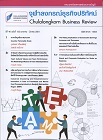Industrial Clustering and Establishments’ Innovation: A Case of Freshwater and Marine Food Processing Industry in Bangkok Metropolitan Region (BMR)
Main Article Content
Abstract
Abstract
This article examines the relationship between industrial clusters and product and process innovations in Thailand’s freshwater and marine food processing industry. The regression analysis is used to analyze the data obtained from the mail survey with 101 sample establishments. The results show that establishments’ location in the cluster does not directly enhance their innovative capability. They need to invest in R&D to absorb knowledge that is spilled over within the cluster. Also, they need to establish the linkage with the global value chain to acquire new knowledge. The BMR may be more advantageous than other areas in Thailand as it is a large agglomeration of firms and supporting institutions and is also a national hub for international trade and investment. However, for establishments to benefit from locating in the BMR in terms of innovation, they need to invest in R&D and need to link with the global buyers via the OEM system.
Article Details
Opinions and discussions in papers published by the Creative Business and Sustainability Journal (CBSJ) are deemed as personal opinions and the responsibility of the writers. They are not the opinions or responsibility of the Chulalongkorn Business School of Chulalongkorn University.
Papers, content, information etc. appearing in the Journal are deemed to be the copyright property of the Chulalongkorn Business School of Chulalongkorn University. Anybody or any organization that wishes to publish any part of them or use them in any way must obtain written permission from the Chulalongkorn Business School, Chulalongkorn University.


